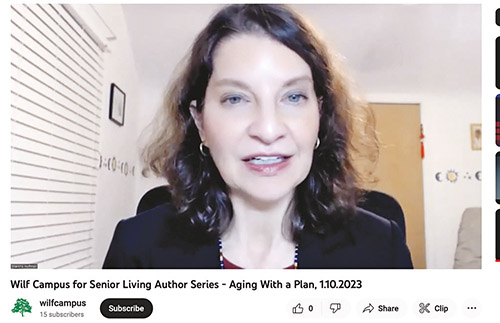
If we’re honest with ourselves, we’d admit that we’d rather not face the topic. As the title of the noted Roz Chast graphic novel asks, “Can’t we talk about something more pleasant?”
Nonetheless, the effects and implications of old age are facts of life and something we will all face—in our parents’ lives and in our own. Advance preparation can make a big difference.
To help community members get grasp on the issues involved, the Wilf Campus for Senior Living in Somerset recently sponsored a talk on Zoom by Sharona Hoffman, author of “Aging With a Plan: How a Little Thought Today Can Vastly Improve Your Tomorrow.” The event is now also on YouTube.

Director of Marketing Donna Oshri explained in her welcome that the Wilf Campus for Senior Living is a continuum of care that “reflects Jewish traditions, yet welcomes all” to participate in their services. The Wilf Campus includes the Stein Assisted Living Residence, Stein Hospice, Wilentz Senior Residence, Wilf at Home, and the Wilf Transport Service.
Hoffman is the Edgar A. Hahn Professor of Law, Professor of Bioethics, and co-director of the Law-Medicine Center at Case Western Reserve University School of Law. At the start of her presentation, Hoffman said that she was inspired to write her book based on her experiences over 18 months in 2012-2013, when both her parents died and her husband was diagnosed with Parkinson’s disease at age 54. She said that she gained a lot of practical experience, and the book was “my own effort to deal with my anxieties and to find some answers for myself.” The goal of the book, she said, is “to put my own professional and personal experiences to good use and to help others.”
Hoffman started with a few facts and figures. In 2022 there were 56 million U.S. residents aged 65 or older, who were 17% of the population. In 2035 it is estimated there will be 77 million adults 65 or older, or 21% of the population. In 2020 there were 6.7 million residents 85 years old or older. Average life expectancy in the U.S. is 78.18 for men and 82.65 for women, with many living to be older.
At the same time, many people are not sufficiently prepared for aging. Research shows that 33% of baby boomers have less than $25,000 in retirement savings, and 25% of adults have no retirement savings. An average 65-year-old couple may need $295,000 in medical care in their final years.
Hoffman was once asked: Should an aging couple prioritize helping their children with higher education costs or putting money away for their own retirement? Her view is that there are many options that young people can look into to pay for higher education costs, such as loans and work study, while their parents can only look to themselves to put away money for retirement.
Turning to legal documents, Hoffman shared that U.S. statistics show that only 46% of American adults have wills and only 75% of seniors. She urged participants to get a will, as these documents allow someone to thoughtfully directly where their resources will go; according to U.S. law, without a will all of a person’s resources upon their passing are directed to their spouse and/or children. A will enables a person to bequeath prized possessions or funds to other relatives, friends or causes they hold dear.
Hoffman urged viewers to also sign two other essential documents—a Durable Power of Attorney for Property and Finances, which designates a decision-maker and an alternate who can make vital determinations on financial matters when needed, and a Durable Power of Attorney for Health Care, who oversees medical decisions for the person when needed. She suggested as well that each person leave detailed instructions on their wishes for a funeral, sign a living will, and make sure their designated decision-makers and their doctors have copies of the paperwork that affects them.
She noted that she’s heard of cases where a parent designates all their children as decision-makers for their health care. She said this is a bad idea, as it can easily lead to intra-family disagreements and to conflicting advice to doctors.
Hoffman recommended that these important documents be revisited and updated whenever a person experiences any of the 5 D’s—reaching another decade of age, the death of a family member, divorce, a serious medical diagnosis, or a marked decline in capacity.
She noted that 70% of senior citizens have two or more chronic conditions and many see an average of four specialists each year. These conditions are best served by a medical professional who coordinates all their care, such as a geriatrician. Yet there is a shortage of full-time geriatricians, so many seniors receive fragmented or uncoordinated care, which can lead to undesirable effects when different prescriptions interact. To help seniors and their caregivers navigate the challenges of managing care, Hoffman suggested that they ask questions; be their own advocate; do their own research online using reputable sources such as the Cleveland Clinic, Mayo Clinic, CDC, and National Institutes of Health; don’t go to doctor appointments on their own; and discuss treatment options with their loved ones. She also suggested that seniors or their caregivers talk with a trusted clergy member, as they may be able to identify support services or helpful resources in their area.
Note: One topic missing from Hoffman’s presentation was the need for legal documents that respect Halacha and the imperatives of Observant Jews. There are a few versions of such documents available, such as one prepared by the Rabbinical Council of America (https://www.nasck.org/wp-content/uploads/2019/08/rca-halachic-living-will.pdf) and another offered by Agudath Israel of America (https://hods.org/pdf/Living Will Agudath Israel.pdf). It is advisable to consult with your personal rav, to identify the halachic documents that are best suited to your needs and hashkafa.
By Harry Glazer









